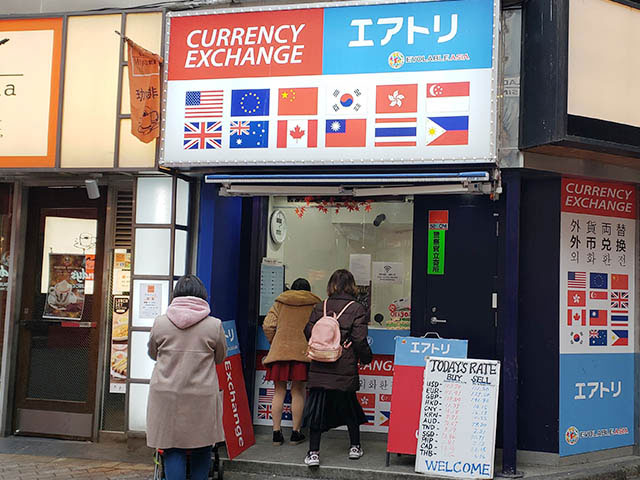The Top 10 Tips For Comparing Local Rates With Rates Online In Terms Of Exchange Rates
Anyone who is involved in travel, business or investment must understand the difference between online and local exchange rates for currency. Local rates refer to the exchange rate provided by banks, ATMs or other exchange facilities within your location or in the destination. Online rates are provided through digital platforms, financial institutions, and other currency converters. They vary greatly, and could affect the amount of money you spend to exchange currency or the return on your investment. If you are aware of the differences between local and online exchange rates, you will be able to make more informed financial choices. The top 10 tips to navigate local and online rates efficiently are provided below.
1. Learn more about the different rates
The rates for local exchanges may differ from rates offered online due to various factors such as overhead costs, market conditions and demand. Local exchange services may have greater fees and lower rates because of operational costs, while online platforms usually offer higher rates due to lower costs of operation. Familiarizing yourself with these differences will help you choose the most appropriate option for your currency exchange needs.
2. Find rates before you convert currencies.
Compare rates on the internet and locally before exchanging currency. Utilize currency converters and websites that are reliable for the most up-to-date rates. Check the online exchange rate against the rates at local currency booths and banks when you plan to travel internationally. This comparison can help you identify the most cost-effective option and also save you money.
3. Utilize Online Currency Exchange Platforms
Online currency exchange platforms such as Wise (formerly TransferWise) and Revolut typically offer more affordable rates and less fees when compared with local banks and exchange kiosks. These platforms provide transparent fees and real-time rates. You can obtain the most competitive exchange rates using these platforms.
4. Be aware of the dynamic currency conversion (DCC).
It is possible that you can make purchases in local currency making use of Dynamic Exchange Rate Conversion. Although it is a convenient option, it is often associated with unfavorable conversion rates and fees. You can avoid DCC charges by paying local currency. You will also benefit from more favorable exchange rates.
5. Comparing Costs and Convenience Cost
If you're deciding between local and online rates be sure to consider the cost in relation to the convenience. Local exchanges can provide speedy access to cash when you are traveling. Exchanges online offer lower rates, however they require you to set up an account and wait for the funds transfer. To decide which is the most suitable option for you, evaluate your requirements in relation to your travel or business plans.
6. Keep an eye on the exchange rate trends.
Monitoring the trends in exchange rates will help you make educated decisions on when to convert your currency. Online platforms offer historical data, analysis tools and allow you to monitor the fluctuations in exchange rate. Knowing how markets work will help you plan your currency exchanges better so that you can benefit from the best rates.
7. Calculate ATM fees and withdrawing limits within your area.
– Be aware that local withdrawals may result in fees. Different banks can charge different fees on international transactions. ATMs typically have their own limit on withdrawals. If you research local ATMs prior to your travel, you will be able to identify ATMs that have lower fees and better rates.
8. No-Fee Currency Exchange Services
Certain banks or online platforms provide free service for exchange of currency, specifically for customers with accounts. This is particularly beneficial for regular travelers and companies that have to deal with foreign currencies regularly. Establishing an account will allow customers to take advantage of lower rates and better service. This can increase your savings.
9. Get advice from Financial Experts for Large Transactions
If you are dealing with large sums of money or currency exchanges that are complicated consulting financial specialists can be very valuable. Currency specialists can provide insights on the best ways to dealing with the local and online rates with ease. This is important, especially for companies or investors that engage in international trade.
10. Make a plan for your currency needs
Making plans ahead can help you reduce time and costs whether you are traveling for business or on vacation. Consider how much you'll need to pay for your trip, and then decide the best exchange rate. If local exchange rates aren't favorable, you should convert your cash online before you go. You'll receive higher rates and will not lose money.
With these helpful tips on local versus online rates, you will be able to make sense of the complexity of currency exchange more effectively, whether you're traveling for business or keeping track of investments. Knowing the advantages and disadvantages of both will help you to make decisions about your finances in line with your objectives and save you money. View the top her latest blog about USD to AUD for website tips including us dollar to rmb, aud to usd, cad to usd, usd to cop, pound to dollar, convert pounds to dollars, dollar to won, usd to japanese yen, us to baht, baht to usd and more.

Top 10 Tips On Transaction Limits In Terms Of Exchange Rates And Rates
Limits for transactions play an essential role in all financial activities. Limits are set to limit the maximum money that can easily be transferred in the time frame. They are typically established by financial institutions, payment platforms or banks. Understanding the limitations of transactions is vital to improve your financial strategies and avoiding excessive costs or delays. For travelers, transaction limits can impact cash withdrawals and purchases from abroad. For companies, transaction limits could impact the payment process as well as the management of cash. Investors should be aware of the limits of their transactions when purchasing or disposing assets. The top 10 tips for managing limits on transactions in your financial dealings are listed below.
1. Be aware of your bank's transaction limits
Generally speaking, each bank or financial institution has a limit on transactions such as withdrawals, purchases and transfers. Familiarize yourself with these limits before you travel or engage in large transactions. This knowledge can aid you in planning your finances effectively and avoid issues when trying to access funds or purchase items from abroad. Contact your bank or go to their website to find out your limit on your account.
2. Know how to withdraw your cash prior to Traveling
While traveling, it is essential to plan your cash withdrawals in order to remain within the limitations of transactions for your bank. You can calculate the amount of cash you'll need for your trip if you know what your daily withdrawal limits are. If possible, you should withdraw more money at one time so that you do not run out of cash. However, you must be aware of fees for ATMs in foreign countries. You should also have a backup plan of payment in case the withdrawal limits you have set are exceeded.
3. Utilize Multiple Payment Methods
If you have a limit on your transactions and you are subject to transaction limits, it could be risky to rely solely on a single kind of payment. To ensure you always have funds available, make use of a combination between credit/debit card or cash, as well as mobile payment applications. This strategy helps you avoid exceeding the limits of transactions for one account. This also lets you be flexible in managing your finances when travelling or doing business.
4. Be aware of your transaction activity regularly
Monitor your transaction activity regularly to keep track of your spending. This will also help you not to exceed your budget. A lot of banks have mobile apps that let you track your transactions in real time and provide insight into your balance and any fees incurred. Watching your account activity will aid in managing your the finances and reduce unexpected costs when purchasing items.
5. Be sure to inquire about limits for international transactions
If you intend to purchase items from abroad or make withdrawals, ask your bank for their policy regarding the limits for international transactions. Certain banks prohibit transactions that are conducted in foreign currency. This can affect your ability make purchases and access funds when traveling abroad. It is possible to organize your trip better when you are aware of these limitations.
6. Set up alerts for transactions
Many financial institutions provide alert systems, which will let you know that you are on the verge of exceed your limit on transactions. This will help you plan your finances ahead of time and prevent you from overstepping your limits. This feature is particularly helpful for travellers who might be more susceptible to losing track during travel.
7. Be Aware of Daily and Monthly Limits
Limits on transactions may vary depending on the timeframe, such as monthly or daily limits. If your bank permits you to withdraw certain amounts every day, it could have lower limits for monthly transactions. Knowing these timespans will aid you in planning your transactions effectively, ensuring you have access to funds whenever you need them, without exceeding your limits.
8. Check with your bank regarding temporary limits and increases
Consider asking your bank to grant a temporary increase in your limit if you are anticipating more significant transactions. Many banks are willing to accept requests for greater limits if you provide an explanation that is valid, for example, a trip planned or a major purchase. Contact your bank in advance to discuss your needs and any necessary documentation to facilitate the process.
Review the Limitations of Payment Platforms
Utilizing payment platforms such as PayPal or Venmo can also result in limitations on transactions. Depending on the status of your account verification and user history each platform could have different maximum transaction limits. Be sure to check these limits prior to performing transactions to avoid any interruptions or delays.
10. It is important to be aware of the restrictions for investment transactions
Investors aren't allowed to buying or selling securities through brokerage accounts. These limits may limit your ability to complete trades in a short time during volatile market periods. Know your brokerage's transaction limits and the best way to utilize them.
Being aware of and managing the limits of your transactions will allow you to navigate the complexity of business, travel and investment monitoring more effectively. Being aware of your bank's guidelines, preparing to withdraw cash, using different payment options and keeping a watchful check on the transactions you make will empower you to make better financial choices. Ultimately this knowledge can aid you in avoiding unnecessary charges or disruptions. It can also improve your overall strategy. View the most popular get more information for CZK to EUR for more tips including usd to euro exchange rate, dollar to php, doller to rupee, 1 usd in rupees, usd to euro exchange rate, jpy usd, euro usd, us dollar in indian rupees, convert euro to usd, usd to colombian peso and more.

